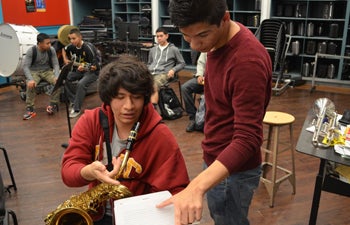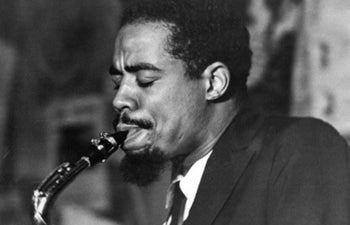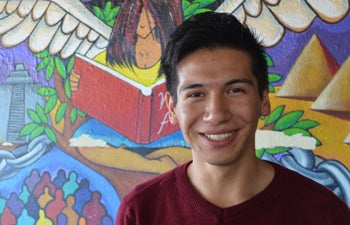Playing It Forward
First the high, brassy notes of the trumpets sound, followed by the mellow, reedy tones of the alto saxophones. Tumbling piano scales join the cacophony accompanied by rolling drum beats and the slow groove of an electric bass guitar. The Foshay Symphonic Band is tuning up and at its helm is Eduardo Mollinedo-Piñon, a comparative literature major in his junior year at USC Dornsife.
Mollinedo-Piñon, who helps direct the music program at The James A. Foshay Learning Center, a K-12 school a few blocks from the USC University Park campus, was once a student at Foshay. Now that his dream of attending USC is a reality, he is giving back to the young students at his former middle and high school.
He knows USC prides itself on volunteerism.
“USC has wonderful study abroad volunteer programs, but I don’t need to study abroad to make an impact,” Mollinedo-Piñon said. “I believe I am making the most impact as a volunteer when I am involved with my own community, here at USC and Foshay.”
The son of a Guatemalan father and a Mexican mother, Mollinedo-Piñon is a first generation college student who grew up in the tough Los Angeles neighborhood of Watts. His journey to USC is one of courage, persistence, intelligence and a spirit of generosity toward his community.

Eduardo Mollinedo-Piñon gives some musical advice to Foshay student Christopher Ayuso. Behind them, from left, are Jeffrey Flores, Byron Gomez and Melvin Perez. Photo by Erica Christianson.
Mollinedo-Piñon and his parents applied for a transfer permit to Foshay after learning of its good reputation while he was attending a nearby elementary school. In sixth grade, he joined the music program, learning to play the flute. Through Foshay, a member of USC’s Family of Schools, he became involved in the USC Thornton Outreach Program and added the saxophone to his repertoire.
Inspired by his experience with university faculty and students, he joined USC’s Neighborhood Academic Initiative (NAI), a seven-year tutorial program that prepares low-income students for admission to higher education.
Now a McNair Scholar at USC Dornsife, Mollinedo-Piñon used research training provided by the scholarship to research the history of jazz in his community. He incorporated his findings into a jazz history course he taught to Foshay’s elementary students.
Through his research, he learned that a celebrated jazz club, Club Oasis, existed across the street from Foshay in the 1950s and 60s.
“Louis Armstrong played there and Ella Fitzgerald sang. Eric Dolphy played there, too,” he said, adding that Dolphy, a talented bass clarinet player, saxophonist and flautist, grew up in the neighborhood and attended Foshay. When he was in middle school he won a city-wide scholarship to study music at USC.

Eric Allan Dolphy, Jr. (June 20, 1928 – June 29, 1964) was an American jazz alto saxophonist, flautist, and bass clarinetist, who attended Foshay Learning Center.
“Whenever I asked the kids who their favorite jazz musician was, they always said Eric Dolphy. They are so proud. ‘There is this jazz musician and he went to Foshay and USC and he looked like me and he grew up on the same streets as me.’ ”
Foshay’s music program is impressive. Its students have performed at the Walt Disney Concert Hall, Opening Night of the Hollywood Bowl, the Playboy Jazz Festival and Carnegie Hall. Many are also part of the L.A. Philharmonic’s Youth Orchestra Los Angeles (YOLA) program led by conductor Gustavo Dudamel. The program helps provide intensive music training and free instruments to students from underserved neighborhoods.
“I think that playing opening night at the Hollywood Bowl with the Foshay Symphonic Band was a defining moment of my life,” Mollinedo-Piñon said, his face lighting up at the memory of the concert, which occurred on his last day of high school.
“I started out being a part of the music program in 6th grade and I’m 20 now so literally half my life has revolved around Foshay and the music program.”
As part of his volunteer program, Mollinedo-Piñon is only officially supposed to show up an hour a week, but spends much more time than that helping out at Foshay, where he has become a mentor to many of the students.
“They ask me ‘Can you help with my personal statement? Can you help me fill in my financial aid forms? I’m thinking of applying to USC, can you give me any advice?’ ” Mollinedo-Piñon said. “A lot of these kids will be first generation college students like me, so often they don’t have anyone at home who can help them out or give them advice.”

USC Dornsife comparative literature major Eduardo Mollinedo-Piñon gives back to Foshay Learning Center, where he was a USC Neighborhood Academic Initiative student, by helping to direct the K-12 school’s music program. Photo by Erica Christianson.
Mollinedo-Piñon speaks with pride about Foshay’s renovated school auditorium which was recently transformed by a $7.5-million grant into a state-of-the-art performing arts theatre.
Prior to renovation, the 90-year-old building was run down, the stage had no lighting, curtains, or acoustical design and the air conditioning did not work, making it uncomfortable for students to perform in hot weather.
Thanks to funding from Measure Y, Foshay installed a new sound and lighting system, a rehearsal room, improved acoustical design and new seating.
Back in the practice room, the din gradually settles into disciplined scales under the watchful eye of Foshay’s music director Vincent Womack, before the band breaks into a swinging rendition of Watermelon Man, Herbie Hancock’s 16 bar blues composition.
“Eduardo’s contributions have been invaluable,” said Womack, who taught Mollinedo- Piñon from seventh to 12th grade. “Because he was here not so very long ago himself, he has perspective that enriches these kids’ experiences.”
Despite his commitment to his community, Mollinedo-Piñon is also determined to see the world. Directly after graduation, he plans to apply for a Fulbright and study abroad before pursuing a career in arts education and public service.
“Your major does not define you,” he said. “The reason I got involved in music was not necessarily because I want to go on and become a professional musician. But music gives me something else in my life, another dimension. Music made a big impact on my life, it gave me a sense of purpose. I want the students I work with to have the same sense of belonging.”